Radio
Lost Liz
Michael Vestey
This week, the new acting managing director of BBC radio, Michael Green, for- mally took over, following the mysterious departure of Liz Forgan. The new chair- man of the board of governors, Sir Christopher Bland, is also in situ and the survival of BBC radio as we know it is now in the balance.
Bland, living up to his name, has said lit- tle so far about the future direction of the BBC, and even less about radio, except that he doesn't listen to it much, though he catches Today on Radio Four. I doubt if radio matters to him much, or indeed any programmes on the BBC as a whole. He is, after all, a money man, and a very success- ful one. As a mover and shaker, an expert in share options, he will be more con- cerned with dealing with politicians in the run-up to a general election, BBC finances and grappling with the Orwellian manage- ment structures of his director general, John Birt. These are based on methods and theories of management consultancy whose complexity makes Einstein's Theory of Relativity read like Enid Blyton.
Modern management theories strike me as being one of the great charlatan phe- nomena of the late 20th century, like coun- selling and psychotherapy, or one of those religions or cults that grip the simple- minded. They are often a substitute for common sense or original thought, and they are very expensive. When the BBC was spending many millions on hiring these people, I remember one of them coming up to me with a look of amaze- ment on his face. It was at the height of the recession and he said he couldn't believe that a corporation was throwing so much money at them. He'd just come from an assignment at a ball-bearing factory, or something of the sort, and was keen to apply to the BBC the same nostrums he'd implemented there. So if the BBC goes into ball-bearings, you read it here first.
Bland was not in evidence on Medi- umwave on Radio Four last Sunday. The programme purported to examine the future of BBC network radio, but the chairman was probably more interested in features of another kind. Still, we could lis- ten to Michael Green and Jim Moir, con- troller of Radio Two. They sounded like a couple of government ministers defending their leader's policies.
The presenter, Vincent Hanna, adopted the deferential tone he normally reserves for senior Labour Party figures. There was none of the fearless questioning he often directs at senior Tories, but then these were his employers, of course. He remind- ed me of one of those 1940s BBC inter- viewers: 'Good morning, Mr. Attlee. Did you have an interesting trip to Bongo Bongo land; sir?"Yes, thank you.' And did you have any interesting discussions?' `Yes, very interesting.' Is there anything else you'd like to tell us?"No, I don't think so.' Thank you, sir.'
Green said radio was batting more vigor- ously than ever before, but then, like his boss John Birt, began to rewrite history. 'If you go back, looking at the Radio Times over the last 10 to 20 years, you will not find as good a range of programmes and the quality of output, dare I say it, that we're making today.' Hanna responded like a limp wrist with a 'dare I say it' question — the daring was becoming infectious — on the lines of, was radio a waning asset? `Not a jot,' said Green. Hanna, helpfully: `You can cope with change?' We certainly can.'
This was strong stuff and I thought I might need a steadying brandy. The tension was palpable. Hanna asked him about Liz Forgan's resignation. Green said, 'The cir- cumstances were not in the least suspi- cious. She felt that after three years in the job she'd made huge strategic changes for network radio and decided to move on. And that is it.' Hanna said, gently, 'All I can say, Michael, is that you are one of the few people around Broadcasting House who subscribes to that view.' But he added hastily, 'And that's not my fault.' Any moment I thought he'd say, 'Sorry, sir, have I overstepped the mark?'
Step aside, 0 craven one, and allow me to rephrase the question, Vincent: All I can say, Michael, is that nobody believes you, especially as a Trappist silence surrounds the whole affair. Green did admit that he and Forgan were opposed to radio news and current affairs moving to Shepherd's Bush to be subsumed into television, but that the BBC decided otherwise. By BBC he meant John Birt and the management consultants; but the idea that the 'special- ness' of radio was under threat was abso- lutely wrong, he added. Of course, Green isn't responsible for news and current `Look at the eenie weenie mortgage rate.' affairs on network radio, Tony Hall is, so it's a bit of a red herring. Green, if he sur- vives, will have to fight to stop all other radio output, drama, light entertainment, features, from merging with television.
Green also denied that by broadening the audience base, Radio Four was moving downmarket. He really must think we are all stupid. Ten years ago — when Green appears to think programmes weren't as good as they are now — Radio Four would never have broadcast a science programme with a script and presenter's delivery so cretinous that they make Butlin's tannoy announcements sound like The Brains Trust. I refer to the recent New Sexual Nature series on Radio Four. There isn't room to list the other programmes that have a downmarket sound to them.
No, I think it's time I wrote to the Her- itage Secretary Virginia Bottomley to see if we can't have a bit of John Major's Citi- zens' Charter injected into the BBC. The Royal Charter is no longer enough.


































































 Previous page
Previous page